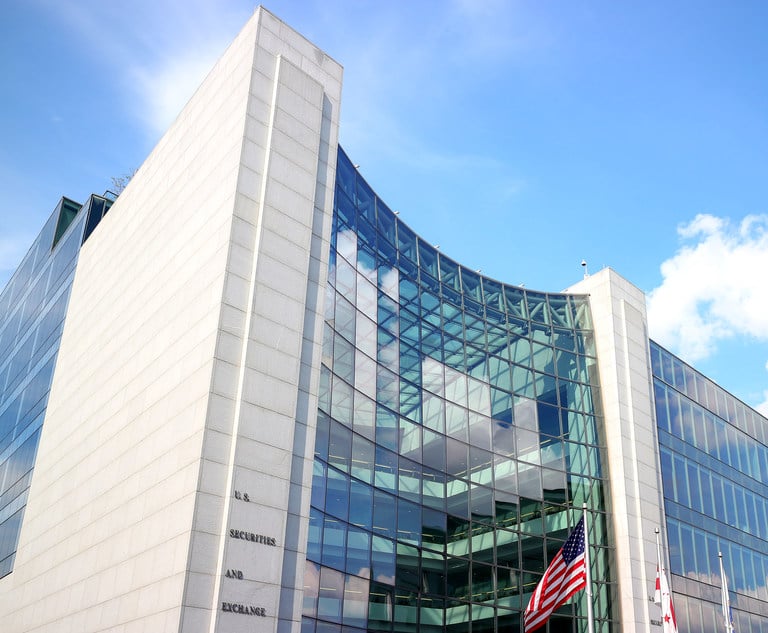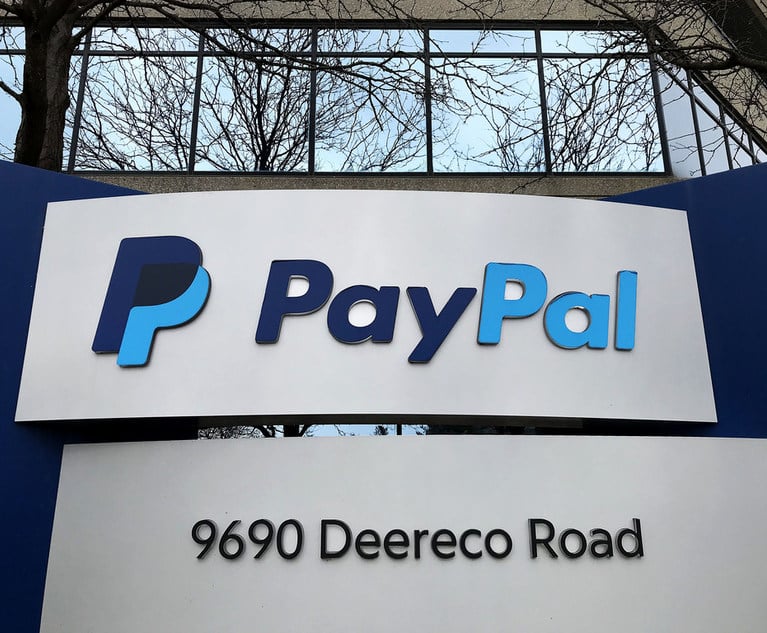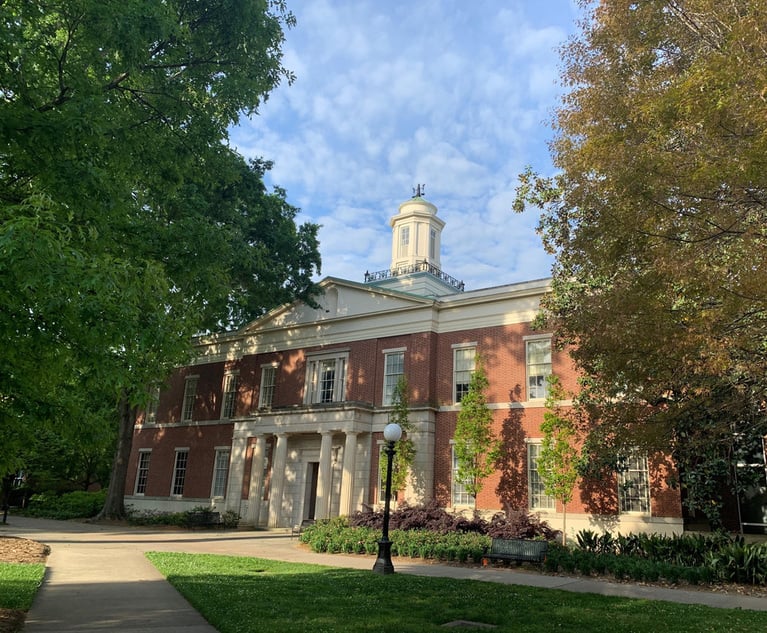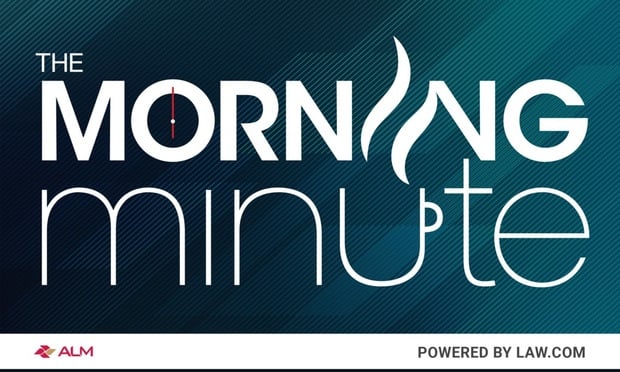A COVID Lit Funding Boom?, Predicting Client Needs, CA Bar Exam Misses Diversity Mark: The Morning Minute
Here's the news you need to start your day.
October 20, 2020 at 06:00 AM
4 minute read
Want to get this daily news briefing by email? Here's the sign-up.
WHAT WE'RE WATCHING
LIT FUNDING FRENZY – The COVID-19 pandemic looks to be good for business…if you're a litigation funder. A new survey by Burford Capital found a 100% increase over the past three years in the number of in-house and private lawyers who reported that their companies and firms were using litigation funding, Phillip Bantz reports. Not only that, but a majority of the surveyed lawyers said litigation funding will be "increasingly critical" as legal departments look to reduce their costs amid the pandemic. Meanwhile, on Monday, Burford became the first litigation funder to be publicly traded in the United States, making its debut on the New York Stock Exchange, Dan Packel reports.
A CLIENT CRYSTAL BALL - Can artificial intelligence help law firms anticipate their clients' needs long before problems arise? Baker McKenzie is betting on it. The global firm has partnered with software developer SparkBeyond as part of an initiative dubbed Reinvent, Victoria Hudgins reports. Leveraging firm and third-party data, Baker McKenzie will use SparkBeyond's technology to predict what services clients will need, and what is driving that demand. The software will generate predictions of future risks for a client, then rank those risks based on their likelihood. While lawyers generally remain skeptical about the accuracy of artificial intelligence, observers say this type of program has a strong shot at widespread adoption.
CUT SO DEEP – A modest reduction in California's bar exam cut score won't do much to solve the Golden State's attorney diversity woes. A new study over 11 years' worth of bar exam data finds that the California Supreme Court would need to drop the cut score to at least 1350 to produce significant gains in minorities entering the state's lawyer ranks, Karen Sloan reports. California had the second-highest bar exam cut score in the nation until July, when the high court lowered it from 1450 to 1390. The study's authors conclude that a further reduction in the cut score would open the door to licensure for hundreds of lawyers of color without compromising public protections.
EDITOR'S PICKS
This content has been archived. It is available through our partners, LexisNexis® and Bloomberg Law.
To view this content, please continue to their sites.
Not a Lexis Subscriber?
Subscribe Now
Not a Bloomberg Law Subscriber?
Subscribe Now
NOT FOR REPRINT
© 2025 ALM Global, LLC, All Rights Reserved. Request academic re-use from www.copyright.com. All other uses, submit a request to [email protected]. For more information visit Asset & Logo Licensing.
You Might Like
View All
Librarian's Termination Violated First Amendment Protections, Lawsuit Claims
3 minute read
SEC Sued for Failing to Reveal Records Involving Simpson Thacher Attorney
3 minute read
PayPal Faces New Round of Claims; This Time Alleging Its 'Honey' Browser Extension Cheated Consumers

Law Firms Mentioned
Trending Stories
- 1Thursday Newspaper
- 2Public Notices/Calendars
- 3Judicial Ethics Opinion 24-117
- 4Rejuvenation of a Sharp Employer Non-Compete Tool: Delaware Supreme Court Reinvigorates the Employee Choice Doctrine
- 5Mastering Litigation in New York’s Commercial Division Part V, Leave It to the Experts: Expert Discovery in the New York Commercial Division
Who Got The Work
J. Brugh Lower of Gibbons has entered an appearance for industrial equipment supplier Devco Corporation in a pending trademark infringement lawsuit. The suit, accusing the defendant of selling knock-off Graco products, was filed Dec. 18 in New Jersey District Court by Rivkin Radler on behalf of Graco Inc. and Graco Minnesota. The case, assigned to U.S. District Judge Zahid N. Quraishi, is 3:24-cv-11294, Graco Inc. et al v. Devco Corporation.
Who Got The Work
Rebecca Maller-Stein and Kent A. Yalowitz of Arnold & Porter Kaye Scholer have entered their appearances for Hanaco Venture Capital and its executives, Lior Prosor and David Frankel, in a pending securities lawsuit. The action, filed on Dec. 24 in New York Southern District Court by Zell, Aron & Co. on behalf of Goldeneye Advisors, accuses the defendants of negligently and fraudulently managing the plaintiff's $1 million investment. The case, assigned to U.S. District Judge Vernon S. Broderick, is 1:24-cv-09918, Goldeneye Advisors, LLC v. Hanaco Venture Capital, Ltd. et al.
Who Got The Work
Attorneys from A&O Shearman has stepped in as defense counsel for Toronto-Dominion Bank and other defendants in a pending securities class action. The suit, filed Dec. 11 in New York Southern District Court by Bleichmar Fonti & Auld, accuses the defendants of concealing the bank's 'pervasive' deficiencies in regards to its compliance with the Bank Secrecy Act and the quality of its anti-money laundering controls. The case, assigned to U.S. District Judge Arun Subramanian, is 1:24-cv-09445, Gonzalez v. The Toronto-Dominion Bank et al.
Who Got The Work
Crown Castle International, a Pennsylvania company providing shared communications infrastructure, has turned to Luke D. Wolf of Gordon Rees Scully Mansukhani to fend off a pending breach-of-contract lawsuit. The court action, filed Nov. 25 in Michigan Eastern District Court by Hooper Hathaway PC on behalf of The Town Residences LLC, accuses Crown Castle of failing to transfer approximately $30,000 in utility payments from T-Mobile in breach of a roof-top lease and assignment agreement. The case, assigned to U.S. District Judge Susan K. Declercq, is 2:24-cv-13131, The Town Residences LLC v. T-Mobile US, Inc. et al.
Who Got The Work
Wilfred P. Coronato and Daniel M. Schwartz of McCarter & English have stepped in as defense counsel to Electrolux Home Products Inc. in a pending product liability lawsuit. The court action, filed Nov. 26 in New York Eastern District Court by Poulos Lopiccolo PC and Nagel Rice LLP on behalf of David Stern, alleges that the defendant's refrigerators’ drawers and shelving repeatedly break and fall apart within months after purchase. The case, assigned to U.S. District Judge Joan M. Azrack, is 2:24-cv-08204, Stern v. Electrolux Home Products, Inc.
Featured Firms
Law Offices of Gary Martin Hays & Associates, P.C.
(470) 294-1674
Law Offices of Mark E. Salomone
(857) 444-6468
Smith & Hassler
(713) 739-1250









